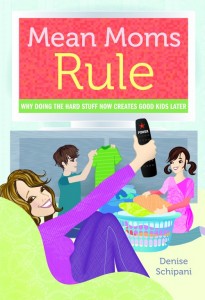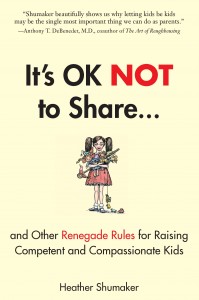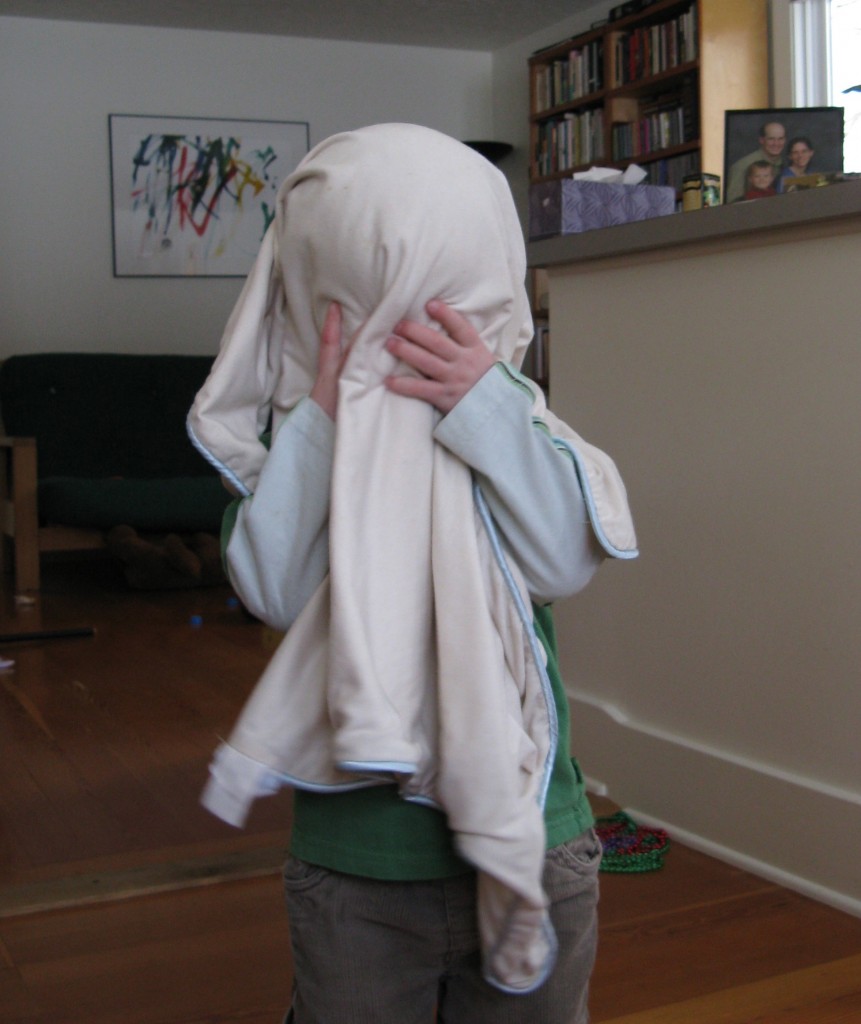A World of Books and Children
Search and enjoy 8 years of posts chock-filled with ideas from It’s OK Not to Share and beyond.
I wrote recently about chores, and today guest author Denise Schipani, author of Mean Moms Rule is joining me to share her thoughts on the subject. She also touches on another important aspect of this blog, which is how to balance your own time, needs and adult dreams while being a parent. Sometimes it's easy to get lost in children's constant clamor for attention, and although kids do need oodles of time, they also need to rely on their own devices, play by themselves and understand you have a separate life.

Q. Your first two Mean Mom Manifestos are about kids not being extensions of yourself and raising kids without losing yourself in them. What are the dangers to parents when their life becomes only "mom" or "dad?" Did this happen to you?
To answer the second part first, no, that didn’t happen to me. I was keenly aware of the possibility of it happening, and I think that was enough to keep me from sinking into motherhood so far that I couldn’t climb out.
The dangers, to my mind, are very real. First of all, if you devote every single iota of your mental, emotional, and psychic self into Being a Mother, you’ll never measure up to what you think that ought to mean. Second, there will be a time you’ll go looking for yourself (for the woman who used to love George Clooney movies and mystery novels and working and wearing heels and dreaming of what she wants to be when she grows up – or whatever your definition of yourself is), and find no one home.
And third, you do your child no favors. Babies need to be cared for constantly and kids want to be catered to constantly, but they don’t want to see you become their servants. Seriously, they don’t, even if they act as though they do. They count on you, but they also want to respect you. Think of it this way: you want your child to grow up to be confident and independent and a decent, whole person who finds his or her own unique way to contribute to the world, correct? Then give your children a role model by being that person yourself! And I promise you can remain yourself and also remain an excellent parent who meets your babies’ and children’s needs. Put more simply: you get no awards for being a martyr.
Q. When did you discover that kids feel pride in chores and learning life skills? Was this something you felt as a child?
You’re correct in saying that I felt it as a child. In fact, I recall it pretty vividly. I was older, a young teen, when the feeling of “I did that! I can do that!” gave me pride, but I’d been doing chores forever, so obviously the foundation was there.
When I was about 13, my father showed me how to use the lawnmower, and gave me the responsibility for the lawn every week. (I think my parents promised me a new outfit for a trip we were taking in the fall – think about that! A whole summer of mowing for one outfit? They were geniuses or I was a sucker, or both, but I won in the end anyway.) I took enormous pride in my ability to get out the mower, attach the extension cords, and handle the front yard in a pattern around the trees.
I also used to fold laundry and at one point took on cleaning out and refolding/restacking the linen closet. My mom seized on the fact that I liked it being neat and organized, and gave me a lot of praise, and the job from then on. I’m grateful that I can do all the things I can do (even if, now, the lawn is my husband’s job), and I want my kids to have the pride and the gratitude, as well as of course the practical skills.
Q. For a parent who never really had chores as a kid, how would you guide them? What ages would you say are appropriate for certain chores? (preschool chores, elementary age, older kids)
That’s an excellent question, and I get asked it a lot! I hesitate to assign chores to ages, because so much is dependent on the child’s abilities and proclivities. But in broad strokes, you can certainly get a preschooler to take her plate away from the table, to put her clothes in a hamper, to carry even the smallest thing from the car to the house after a shopping trip. In fact, those small things, carrying something, say, are very instructive because what they’re saying is, “we’re all in this together; we all went shopping for stuff we all need, and we all have to help bring things into the house and put them away.”
For that same reason, I’m a fan of getting kids to do chores that are not specific to just that child. So, while a school age child should be responsible for cleaning up his room and putting toys away that he’s just played with, he should also pointedly be required to do things that are not specifically for him. For example, you can sit with school age kids while you fold laundry, and give them the job of pairing their baby sister’s socks. School age kids can take turns clearing the table, not just their own plates.
I used to iron and fold my father’s handkerchiefs, and grew to like doing something that was for my dad. My eyes were opened to this years ago, before I had kids, and my husband and I were helping my sister move. My husband asked my nephew, then about 10, to help him pack up some of his sister’s belongings. He said, “that’s not my stuff!” And my husband said, “well, none of this is my stuff, right?!” My nephew got it immediately.
Older kids can do more complex things like yardwork and housework, and can take on chores they are independently responsible for, like taking out garbage on the days it’s picked up, or emptying the dishwasher whenever it’s clean. See what kids seem to be jazzed by (some kids actually like stuff like dusting, watching the dust disappear from the table like magic; others like organizing tasks or things they can do without you directing them.) That said, there’s something to be said for having to do things no one likes to do, but which are necessary, like cleaning toilets.
 If you're looking for a different way of thinking about raising kids, take a look at these two "rule books." My book It's OK NOT to Share...And Other Renegade Rules for Raising Competent and Compassionate Kids and Denise's Mean Moms Rule, both published this year.
If you're looking for a different way of thinking about raising kids, take a look at these two "rule books." My book It's OK NOT to Share...And Other Renegade Rules for Raising Competent and Compassionate Kids and Denise's Mean Moms Rule, both published this year.
Let's hear it from you --- Are you losing yourself while being a parent? Do you have any "you" time? Do you think you're expecting enough of your kids? Do you know families who have slipped into the role of parents-as-servants?

Sure - they're cute when they're awake. But writing and kids don't mix.
I started writing a novel last year. Of course, with two young kids and a day job writing nonfiction, I had no time. If I was going to get up extra early to write, that precious 'starlighting' time in the morning had to be sacred, so I put my children's sleeping hours on a timer.
It's dark where I live. In the winter months we go to bed when it's dark and wake up in the dark. For a young kid, there's no distinct clue when it's time to wake up. Is it midnight? Is it 7am? Unless you're old enough to read a clock, it's impossible to tell. Our house is also small: when one person's up, the whole house is up. There's no "away."
So my first step before writing the novel was a trip to the hardware store. I bought an electric timer -- one of those programmable timers people use to flip their living room lights on and off to make potential burglars think someone's at home--and rigged it up to a small blue night light. The easy-to-follow rule: when the the Morning Light is on, you can get up. Not before.
I set it for 6:45am. That gave me a blissful hour or hour and a half to get my writing done in peace. No early risers. No demands or distracting voices from children before quarter to seven.
The Morning Light works like a charm. My kids have a clear signal. I enjoy protected time to concentrate. I finished the first draft of my novel in 10 months.
The Morning Light is my favorite "time-creating" tip for young parents and helps me set limits on the people I live with. Writers, parents, creative dreamers -- what are your tricks and tips to protect your own time? What boundaries do you set on your friends or family to carve out time you need?
I woke up with a dent in my forehead. It comes from dressing up as the Headless Horseman for Halloween last night. Turns out it's tricky to make your head disappear, ride a cardboard horse, and balance a 10-lb. pumpkin in one hand while chaperoning children along the dark streets. But I wouldn't trade it for anything.
This is a joyous, creative time of year for me as I help my kids transform themselves into their dreams-of-the-moment, and frantically stitch, glue and strew bits of fabric and cardboard about the living room floor.
An hour before trick-or-treating started, I was on my hands and knees painting on my horse's eyes and nostrils and attaching a yarn mane. That explains why my steed's red eyes were still glistening when we set out. Hopefully the wet paint sheen only added to the overall effect.
Even though our family starts dreaming up costumes a month before, it's inevitably a mad dash at the end. It's simply hard to squeeze all those creative ideas into the time it actually takes to make them come to life.
Halloween is marvelous because it offers a concrete, creative deadline. Every costume must be done by 5pm on October 31.
We need to extend these types of creative deadlines to our lives. How many books do we want write? How many paintings, poems or other creations? When will we take the time to make our creative ideas come to life? Because that's what it's all about. Bringing our ideas to life in the short lifetimes we have. We may leave scraps of cardboard on the floor, and neglect other parts of life ("mom, we're out of Cheerios"), but we will have created something. Something that gives us fulfillment. Something that brings others joy.
How do you set deadlines for yourself to set aside time for creative projects? Have you been able to stand by your rules? What's stopping you from seriously bringing your ideas to life?


